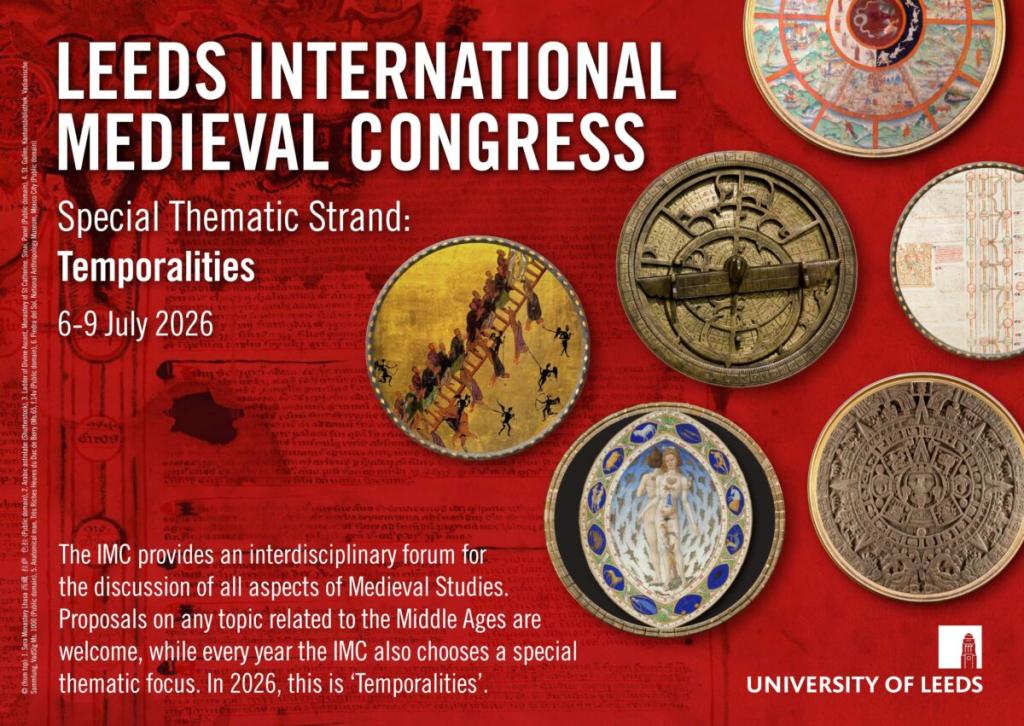IMC国际中世纪大会(International Medieval Congress)由英国利兹大学主办,是中世纪领域在欧洲规模最大的学术会议,该会议核心宗旨在于为中世纪研究学者提供跨学科的前沿学术交流平台,自1994年以来,已召开32届。在2025年召开的第32届中世纪大会中,中国学界由北京师范大学组织,联合北京大学与比利时根特大学,共举办6场专题汇报,1场圆桌讨论,向国际学界展示了中国学界的研究特色与贡献,获得了广泛关注与热烈反响。在此基础上,为了进一步带动中国学界在国际学界中的发声,增加中国学界与国际学界的互动与交流,北京师范大学历史学院与北京大学历史学系将继续组织参加2026年IMC会议,特邀国内中青年学者共同参会。
2026年IMC会议时间:2026年7月6日-9日
会议地点:英国·利兹大学
01 全球中世纪(1-2 session)
在2025年IMC中,中国学界以“全球中世纪“这一中世纪前沿热议潮流为主题,设计了”中西比较“、“中国视角的全球中世纪”、“中世纪社会动态与知识流动”三个子主题,向国际学界展示了中国学者的相关研究与独特见解,引发了广泛关注与讨论。2026年度,将继续以“全球中世纪”为主题,召集报告。领域包含欧洲中世纪研究、全球内亚史研究、中国中古史研究、中西交通、丝绸之路研究。欢迎中国史相关方向学者报名。在这一主题中,既包含欧洲中世纪研究,更包含全球内亚史、中国中古史、中西交通、丝绸之路等方面的研究。我们期待有国际视野的中国中古史、亚洲史中青年学者参与,并期待通过这一设计,逐步联通中国史与世界史的研究,将中国史的研究纳入到更广阔的国际学界讨论之中。
02 中世纪时间
中世纪欧洲史研究主题,拟邀请在传统中世纪欧洲史领域做出独特贡献的研究报告。以及符合2025年度IMC会议'Worlds of Learning'主题的研究报告。2026年度IMC会议的主题是——“时间性(Temporalities)” 。“时间性”通常被理解为对“时间”本身以及人类如何感知时间、时间如何影响生命体验的研究;它横跨哲学、史学、文学、社会学、心理学、考古学、艺术史、音乐、科学等诸多学科。早期研究往往将时间视为“客体”,而当今的中世纪学人则更倾向于探讨“temporalities”——即时间与人之存在、人之能动性相互交织的多元方式。借此视角,我们试图理解中世纪民众如何感知、结构并与之互动,及其对过去、现在与未来的立场。中世纪人与时间的关系是动态的:它随时代演变,呈现多样形态与观念,也塑造了后世对“中世纪”本身的认知,乃至现代身份与历史记忆。因而,“时间性”成为遍布全球中世纪文化的关键特征,亦是继中世纪之后的世界中一项普遍议题。因此,我们欢迎具有中国视角、中国特色的“中世纪(中古)时间”思考。学界考察中世纪时间性最常见的路径,是聚焦当时人们对时间的看法与体验。其过去、现在与未来观深受宗教信条及对“世界起始终结”的释经传统影响;与此同时,日常生活亦被自然与季节变迁所形塑。民众常须依循日历或更精密的计时方式,将日常劳作与自然时间节律对齐。不同的时间流逝观念影响到政治决策、经济交换、物品与工艺生产;人们还操纵时间以映射性别角色、叙事策略、衰老观、族群或社会群体变迁、公私空间转换等;现代人对“中世纪时间”的概念,亦与我们对中世纪时间性的理解乃至误用密不可分。无论是建构“黑暗时代”意象,抑或想象浪漫的骑士世界,这些对过去的投射皆折射出我们自身的时间观,以及当代如何因应多元政治或文化议程而重新组织“中世纪时间”——这正是“中世纪主义”争议的核心。通过考察中世纪世界的时间性,以及今日我们对其过去—现在—未来光谱的再思,大会希望激发国际学者就“中世纪人与时间之关系”及其对当下人类行为、心态与全球生命体验的影响展开活跃讨论。
报名要求:提交英文论文题目与100-300字英文摘要即可;
报名截止日期:2025年9月28日24:00(会议方截止时间2025年9月30日);
报名联系人:北师大历史学院吴愁老师/北京大学历史学系 李隆国老师;
联系电话:18201502980(微信同);
报名邮箱:katharina.wu@bnu.edu.cn;llguo@pku.edu.cn;
备注:会议论文将于12月中旬通知最终录取结果,12月之前,会议摘要可以修改;参会费用由学者自行缴纳)
附:2026年IMC会议主题介绍
Call for Papers: IMC 2026 - Temporalities
The IMC provides an interdisciplinary forum for the discussion of all aspects of Medieval Studies. Proposals on any topic related to the Middle Ages are welcome, while every year the IMC also chooses a special thematic focus. In 2026 this is ‘Temporalities’.
Temporality, commonly understood as the study of time, how people perceived it, and its impact on the human experience of life, is a rich and multifaceted concept that spans many disciplines, including philosophy, history, literature, sociology, psychology, archaeology, art history, music, and science. While earlier studies often treated time as an ‘object’, today’s medieval scholarship increasingly explores temporalities - the many ways in which time is intertwined with human existence and agency. This approach seeks to understand how medieval people perceived, structured, and interacted with time, considering their past, present, and future perspectives.
The relationship between medieval people and time was dynamic, evolving over epochs and involving diverse manifestations and outlooks. It also influenced contemporary perceptions of the medieval period, as well as modern identities and memories of the past. This makes temporality a pivotal feature of medieval cultures spread across the entire medieval globe and a universal theme of study in the world that succeeded the Middle Ages.
The most common way of studying medieval temporalities is by focussing on medieval people’s views and experience of time. How they viewed their past, present, and future was deeply influenced by religious beliefs and exegetical interpretations of the ‘world’s beginnings’, eternity, and end. Along with these shared understandings, everyday lives were shaped by nature and its seasonal changes. Their livelihoods often depended on aligning their daily activities with the natural rhythms of time, interpreted by calendars or more advanced ways of measuring time. Diverse notions of the passage of time affected medieval people’s political decisions, economic exchanges, and production of objects and artefacts. Medieval people manipulated time to reflect their gender roles, narrative strategies, views on human ageing, shifts in ethnic or social groups, or changes in public and private spaces.
Modern concepts of medieval time are bound up with our own understanding and (ab)use of medieval temporalities. Whether we construct images of a ‘Dark Age’, or imagine a romantic time of chivalry and knighthood, these projections into the past reflect our own temporal outlooks and how today we organise ‘medieval time’ in a variety of ways that address modern diverse political or cultural agendas, which lie at the heart of our debate on medievalism.
By examining the temporalities of the medieval world, together with our present-day perspectives on the spectrum of the medieval past, present, and future, the Congress aims to encourage a lively debate by international scholars about medieval people’s relation with time and the impact of this relation on our present-day agencies, mentalities, and global experiences of life.
Key topics across different fields that shed light on the relationship between time and medieval people include, but are not limited to:
· Medieval perceptions of time, temporality, and their modern interpretations
· Concepts of time and temporality in medieval philosophy and theology
· People in time
· Time as an agent of change
· Temporality in political, economic, and socio-cultural relations
· Calculation and estimation of time and dating
· Time measurement by using calendars, sundials, and clocks
· Timing and scheduling meetings and events
· Narratives of time and the language of temporality
· Documentation of time
· Time, memory, and commemoration
·Scholarship, technological development, and temporality
· Temporal materialities
· Time, nature, and the environment
· Methodological approaches to the study of medieval temporalities
· Medieval temporalities in film, media, digital technology, and Artificial Intelligence
· Artistic representations of time and temporality
· Medieval temporalities in literature, music, performing arts, and folklore
· Temporality in law, medical practice, education, and music
· Medievalism and medieval temporalities
· The future of the Middle Ages
The IMC welcomes session and paper proposals submitted in all major languages.
IMC 2026 is the global medieval platform which promotes a broad spectrum of perspectives and critical discussions on medieval history. We aim to engage scholars working at all geographical scales, from global to local contexts, and across various time periods - whether linking the Middle Ages to Antiquity, the early modern era, or focussing on a specific year.
The number of IMC sessions focussed on regions outside Europe continues to grow, and we hope to sustain this trend in 2026. Our contributors come from all areas of medieval studies, including economic, political, social, cultural, demographic, literary, linguistic, artistic, visual, spatial, religious-historical, intellectual, environmental fields, and those addressing landscape and material culture. Moreover, we encourage approaches that integrate evidence from fields beyond traditional medieval studies, such as genetics, bioarchaeology, historical climatology, and more.

转载自:京师世界史

